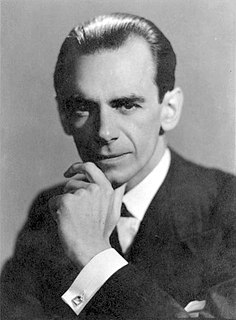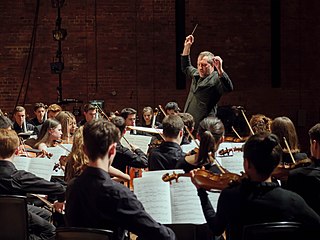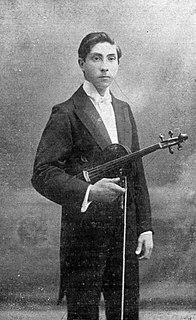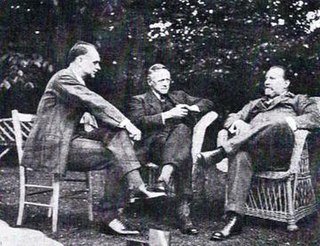Related Research Articles

Sir Adrian Cedric Boult, CH was an English conductor. Brought up in a prosperous mercantile family, he followed musical studies in England and at Leipzig, Germany, with early conducting work in London for the Royal Opera House and Sergei Diaghilev's ballet company. His first prominent post was conductor of the City of Birmingham Orchestra in 1924. When the British Broadcasting Corporation appointed him director of music in 1930, he established the BBC Symphony Orchestra and became its chief conductor. The orchestra set standards of excellence that were rivalled in Britain only by the London Philharmonic Orchestra (LPO), founded two years later.

Sir Arthur Edward Drummond Bliss was an English composer and conductor.

Sir Harold Malcolm Watts Sargent was an English conductor, organist and composer widely regarded as Britain's leading conductor of choral works. The musical ensembles with which he was associated included the Ballets Russes, the Huddersfield Choral Society, the Royal Choral Society, the D'Oyly Carte Opera Company, and the London Philharmonic, Hallé, Liverpool Philharmonic, BBC Symphony and Royal Philharmonic orchestras. Sargent was held in high esteem by choirs and instrumental soloists, but because of his high standards and a statement that he made in a 1936 interview disputing musicians' rights to tenure, his relationship with orchestral players was often uneasy. Despite this, he was co-founder of the London Philharmonic, was the first conductor of the Liverpool Philharmonic as a full-time ensemble, and played an important part in saving the Royal Philharmonic Orchestra from disbandment in the 1960s.

The Piano Concerto No. 1 in D minor, Op. 15, is a work for piano and orchestra completed by Johannes Brahms in 1858. The composer gave the work's public debut in Hanover, the following year. It was his first-performed orchestral work, and his first orchestral work performed to audience approval.
Walter Goehr was a German composer and conductor.

Thomas Joseph Edmund Adès is a British composer, pianist and conductor. Five compositions by Adès received votes in the 2017 Classic Voice poll of the greatest works of art music since 2000: The Tempest (2004), Violin Concerto (2005), Tevot (2007), In Seven Days (2008), and Polaris (2010).

Solomon Cutner was a British pianist known professionally as Solomon.
Adrian Brown is a British conductor. He is a proponent of contemporary music and has several first performances to his credit.
Noel Mewton-Wood was an Australian-born concert pianist who achieved international fame on the basis of many distinguished concerto recordings during his short life.

Eileen Alannah Joyce CMG was an Australian pianist whose career spanned more than 30 years. She lived in England in her adult years.

Leslie Hays Heward was an English conductor and composer. Between 1930 and 1942 he was the Music Director of the City of Birmingham Orchestra.
The Concert Fantasia in G, Op. 56, for piano and orchestra, was written by Pyotr Ilyich Tchaikovsky between June and October 1884. It was premiered in Moscow on 6 March [O.S. 22 February] 1885, with Sergei Taneyev as soloist and Max Erdmannsdörfer conducting. The Concert Fantasia received many performances in the first 20 years of its existence. It then disappeared from the repertoire and lay virtually unperformed for many years, but underwent a revival in the latter part of the 20th century.

Antonio Brosa was a Spanish violinist.
Jean Pougnet was a Mauritian-born concert violinist and orchestra leader, of British nationality, who was highly regarded in both the lighter and more serious classical repertoire during the first half of the twentieth century. He was leader of the London Philharmonic Orchestra from 1942 to 1945.
Eda Kersey was a British violinist who was renowned for her brilliant playing. She premiered a number of important works, including the Bax Violin Concerto, but her career was cut short by her early death.
Benjamin Britten's Piano Concerto, Op. 13, is the composer's sole piano concerto.

Thomas Edward Clark was an English conductor and music producer for the BBC. Through his positions in leading new music organizations and his wide-ranging contacts with British and European composers, he had a major impact on making contemporary classical music available to the British public for over 30 years. He was a leading figure in the BBC's Concerts of Contemporary Music between 1926 and 1939, and he played a significant role in the founding and early development of the BBC Symphony Orchestra. He held prominent positions in the International Society for Contemporary Music (ISCM) from its inception in 1922, and was its president from 1947 to 1952.
British composer Michael Tippett composed his Concerto for Piano and Orchestra between 1953 and 1955 on a commission from the City of Birmingham Symphony Orchestra. The overall character of the work was influenced by the composer's hearing German pianist Walter Gieseking rehearse Ludwig van Beethoven's Fourth Piano Concerto in 1950. Its musical content, while influenced by this concerto, was also shaped largely by Tippett's opera The Midsummer Marriage, which he had completed in 1952. While Tippett had conceived the work initially in the mid-1940s, he had been preoccupied in much of the intervening time with The Midsummer Marriage.
This is a summary of 1939 in music in the United Kingdom.
Bernard Shore was an English viola player and author.
References
- 1 2 Music Web International
- 1 2 3 4 5 classics online
- 1 2 3 4 classics online
- 1 2 3 audiophile audition
- 1 2 3 divine-art.com
- 1 2 3 Arts and Humanities Research Council
- 1 2 chester novello
- 1 2 The Telegraph, 21 Nov 2008
- ↑ boosey.com
- ↑ Balkan download
- ↑ Bach Cantatas
- ↑ chester novello
- ↑ pristine classical
- ↑ Classical source.com
- ↑ Music Web International
- ↑ allmusic